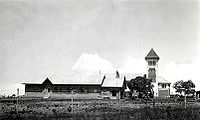Likasi
Demographics

Likasi has a population of around 635,000 (2015). During the 1990s the United Nations set up feeding centres and refugee centres in and around Likasi to assist with the refugees fleeing ethnic violence in Shaba, whose arrival had increased the population of the town some 41,000.
History

Shinkolobwe mine, 20 km west of Likasi (then called Jadotville), was described by a 1943 Manhattan Project intelligence report as the most important deposit of uranium yet discovered in the world. The uranium from this mine was used to build the atomic bombs used in Hiroshima and Nagasaki in 1945. In 1961, during the United Nations intervention in the Katanga conflict, a company of Irish UN troops deployed to Jadotville fought valiantly, but was besieged and eventually surrendered to troops loyal to the Katangese Prime Minister Moïse Tshombe.
Economy

Likasi remains a centre for industry, especially mining, and is a transport hub for the surrounding region. There are mines and refineries supplied by nearby deposits of copper and cobalt. A $17 million crushing plant was installed in nearby Kamatanda that became operational at the start of 2019. The crushed ore is fed to the Heap Leach Unit in Panda, then the copper-containing solution is taken to the electrolysis room at the Shituru Factories in Likasi, where high-quality copper electrodes are produced. There is also an abandoned gold mine in Likasi, which has been commercially depleted but is still dug by artisanal miners.
Transport
Likasi is served by a station on the national railway system. The trains are mostly cargo trains and not passenger trains.
Climate
Likasi has a humid subtropical climate (Köppen: Cwa).
| Climate data for Likasi | |||||||||||||
|---|---|---|---|---|---|---|---|---|---|---|---|---|---|
| Month | Jan | Feb | Mar | Apr | May | Jun | Jul | Aug | Sep | Oct | Nov | Dec | Year |
| Daily mean °C (°F) | 21.4 (70.5) |
21.5 (70.7) |
21.5 (70.7) |
20.9 (69.6) |
18.6 (65.5) |
16.2 (61.2) |
15.9 (60.6) |
18.1 (64.6) |
21.3 (70.3) |
22.8 (73.0) |
22.3 (72.1) |
21.7 (71.1) |
20.2 (68.4) |
| Average precipitation mm (inches) | 212 (8.3) |
205 (8.1) |
214 (8.4) |
62 (2.4) |
6 (0.2) |
0 (0) |
0 (0) |
0 (0) |
8 (0.3) |
65 (2.6) |
177 (7.0) |
226 (8.9) |
1,175 (46.2) |
| Source: Climate-Data.org | |||||||||||||
See also
Notes
- ^ "HENRI MUNGOMA installé officiellement comme nouveau maire de la ville de LIKASI" (video) (in French). RCK TV - Likasi. 27 January 2023.
- ^ caid.cd/index.php/donnees-par-villes/ville-de-likasi/?domaine=fiche
- ^ PopulationStat.com
- ^ ACC/SCN Secretariat with Shoham, Jeremy (8 December 1993) "Current Situation: 11. Shaba Region, Zaire" Archived 2011-05-24 at the Wayback Machine Refugee Nutrition Information System (RNIS), No. 2 - Report on the Nutrition Situation of Refugee and Displaced Populations United Nations Administrative Committee on Coordination, Sub-committee on Nutrition, Geneva
- ^ ACC/SCN Secretariat with Shoham, Jeremy (17 October 1994) "Current Situation: 11. Shaba/Kasai Regions, Zaire" Archived 2011-05-24 at the Wayback Machine Refugee Nutrition Information System (RNIS), No. 7 - Report on the Nutrition Situation of Refugee and Displaced Populations United Nations Administrative Committee on Coordination, Sub-committee on Nutrition, Geneva
- ^ Hogg, Jonny; Ferreira-Marques, Clara (19 February 2013). ""Triangle of death" looms over Congo's mining heartlands". Reuters. Retrieved 8 February 2024.
- ^ Byrne, Ciaran (27 July 2016). "The True Story of the Heroic Battle That Inspired the New Netflix Film The Siege of Jadotville". Time Magazine. Retrieved 8 February 2024.
- ^ McNalley, Frank (15 May 2019). "Five Irish soldiers took their own lives after Jadotville siege". Irish Times. Retrieved 8 February 2024.
- ^ Harding, Andrew (27 March 2009)"Slowdown blights DR Congo economy" BBC News, accessed 27 March 2009
- ^ Rorison, Sean (2008) "Likasi" Congo: Democratic Republic and Republic Bradt Travel Guides, Chalfont St. Peter, England, pp. 143-145 ISBN 1-84162-233-8
- ^ Dolay Tshimanga (16 April 2019), "Le nouveau visage de Gécamines", Business et Finances (in French), Likasi, retrieved 2021-09-13
- ^ "Climate:Likasi". Climate-Data.org. Retrieved 10 April 2014.